Are you looking for a tasty dairy free milk alternative? Perhaps you’ve embraced the veganism trend that is sweeping the nation?
I’m a complete coffee fanatic and I love the creamy texture that milk brings to my coffee. Give me a flat white over an espresso any day!
But here’s the thing…….I want to find a good quality milk alternative for coffee. I’ve discovered that milk and other dairy products just don’t agree with my body. It affects my skin and my digestion, which is seriously annoying as I LOVE cow’s milk!
I’m on the search to find a healthy alternative, which will still make my coffee taste good.
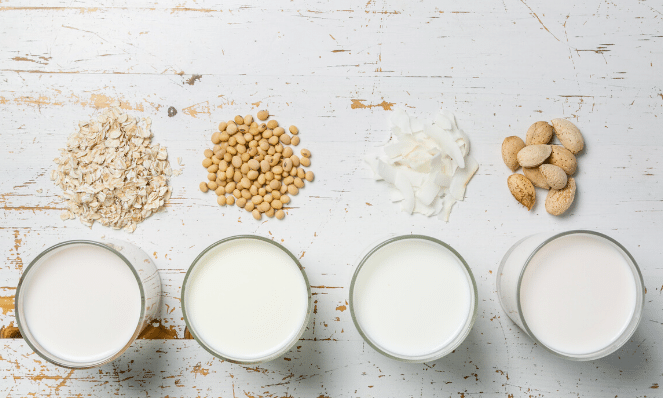
I’ve read a lot about plant-based milks and have decided to give a few of them a try. Scroll down to the end to find out my favourite.
Which are the most common milk alternatives for coffee?
I asked our amazing Coffee & Kin community for their preferred type of non-dairy milk and four options came out on top. Here’s the list:
ALMOND
Almond milk is a liquid made from blended almonds. Almonds are soaked overnight in water and then blended and strained to make almond milk. You can buy unsweetened, sweetened and flavoured almond milks.
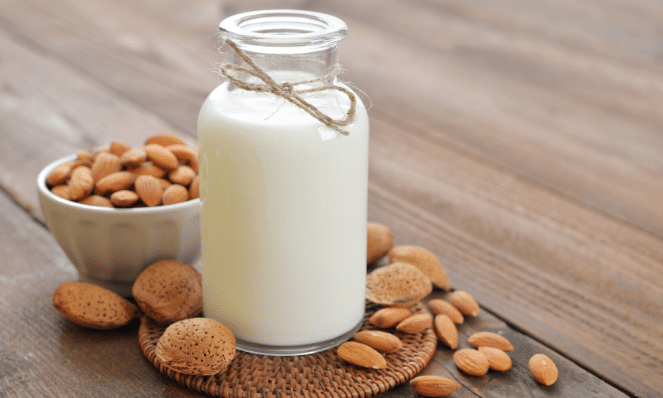
The benefits of almond milk
- Low in calories
- Good source of Vitamin D
- May reduce the risk of heart disease
- Some commercial brands are enriched with extra vitamins, including Vitamin D
- Dairy free
COCONUT
Coconut milk comes from the white flesh of the coconut. The coconut flesh is strained through a cheesecloth and water is added to make a thinner liquid. Rice is also added to a number of the coconut drinks available on the market.
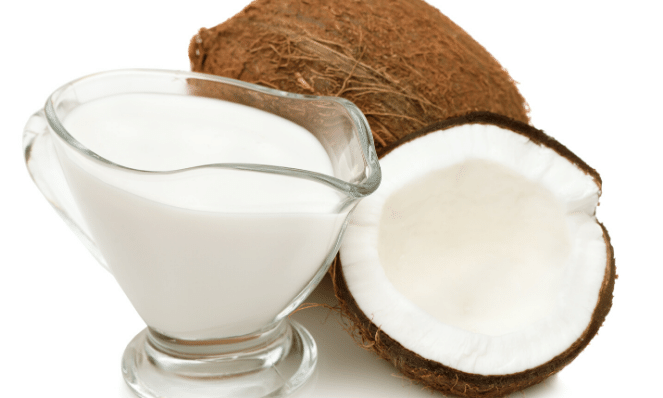
The benefits of coconut milk
- Weight loss – according to Medical News Today, coconut milk contains medium-chain triglycerides (MCTs), which have been linked to weight loss
- Immune support
- Rich in vitamins and minerals
- Dairy free
SOYA MILK
Soya milk is made from soaking and grinding soya beans. It’s a great form of protein and a popular food in Asia. It contains the same amount of calcium as cow’s milk and is also low in calories.
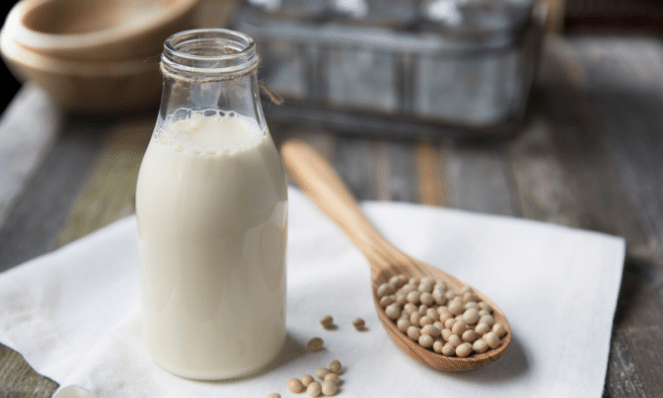
The benefits of soya milk
- Low in calories and saturated fat
- Rich in vitamin K
- Good source of high quality protein
- Dairy free
OAT MILK
Oat milk is the latest trend in plant-based milks. It’s made by blending oats with water and is packed full of fibre.
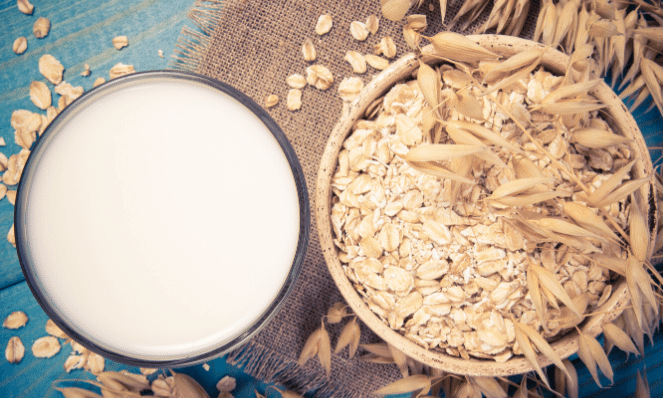
The benefits of oat milk
- Low in fat and saturated fat
- Reduced risk of heart disease (Is Oat Milk Healthy? Good Housekeeping)
- Rich in fibre
- Good source of calcium
- Dairy free
Things to watch out for when buying plant-based milks?

If you’re used to cow’s milk in your coffee, then yes, a plant-based alternative will definitely affect the taste.
Personally, I don’t like almond, soya or coconut milk in my coffee. It just doesn’t taste right. To be honest, I would rather have an espresso or a long black.
Having said that, I think oat milk has a very delicate and unoffensive flavour and goes well in my daily coffee. It also froths really well and makes a great latte.
Will it take the place of proper milk in our household?
No, is the simple answer. I will always prefer cow’s milk in my coffee and fully intend to treat myself at the weekend to a milk based flat white. But on a daily basis, I’m going to stick with oat “milk” because I’m getting used to the taste and it just suits my body better.
What about the environment?
Every day, we’re told that reducing our meat and dairy consumption is one of the best ways to reduce our environmental footprint on the planet. But are all non-dairy alternatives good for the planet? The simple answer is no.
It takes over 6000 litres of water to produce 1 litre of almond milk. The majority of soya is grown in Brazil and contributes to the deforestation of the Amazon rainforest and Coconut milk is grown in tropical climates so has to be transported a long way to reach our shelves. (Are Plant Based Milk Alternatives Better for the Environment?).

If you’re concerned about the environment, your best choice is OAT MILK as it only needs a little bit of water to grow. It has the least impact on our beautiful planet.
Conclusion
Plant-based milks are getting a lot of attention in the press for their health and environmental benefits. Some of these claims are true but don’t be fooled by everything you read. Do your research and always read the label to ensure you’re getting the best quality product that’s right for you.
I will always prefer cow’s milk but I am pleasantly surprised by the oat alternatives. In particular, I like the barista style oat drinks from Oatly and Rude Health.
So it’s time to go and make myself another coffee. If you found this article useful, please leave a comment and share it on social media.
Don’t forget, if you need more coffee, visit our shop to buy the world’s kindest nespresso compatible capsules and seriously tasty freshly roasted coffee beans.
Thank you for reading. I hope you enjoy the rest of your day.
Ruth
- Always check the label. Brands will make claims such as ‘vegan’, ‘non-dairy’ and ‘plant based’ which makes us think that it’s actually really healthy. However, some companies add extra sugar and other unwanted ingredients to enhance the flavour.
- When choosing an alternative milk, make sure there are as few as ingredients as possible in the ingredients list.
- Choose the unsweetened option if you’re concerned about having too much sugar in your diet.
- Don’t assume that plant-based milks are better for you. Cow’s milk is also packed full of nutrients and tastes amazing in coffee. Rude Health has a great article on their website entitled ‘Dairy vs Dairy-Free’, which is definitely worth a read.
Will it affect the taste of my coffee?

If you’re used to cow’s milk in your coffee, then yes, a plant-based alternative will definitely affect the taste.
Personally, I don’t like almond, soya or coconut milk in my coffee. It just doesn’t taste right. To be honest, I would rather have an espresso or a long black.
Having said that, I think oat milk has a very delicate and unoffensive flavour and goes well in my daily coffee. It also froths really well and makes a great latte.
Will it take the place of proper milk in our household?
No, is the simple answer. I will always prefer cow’s milk in my coffee and fully intend to treat myself at the weekend to a milk based flat white. But on a daily basis, I’m going to stick with oat “milk” because I’m getting used to the taste and it just suits my body better.
What about the environment?
Every day, we’re told that reducing our meat and dairy consumption is one of the best ways to reduce our environmental footprint on the planet. But are all non-dairy alternatives good for the planet? The simple answer is no.
It takes over 6000 litres of water to produce 1 litre of almond milk. The majority of soya is grown in Brazil and contributes to the deforestation of the Amazon rainforest and Coconut milk is grown in tropical climates so has to be transported a long way to reach our shelves. (Are Plant Based Milk Alternatives Better for the Environment?).

If you’re concerned about the environment, your best choice is OAT MILK as it only needs a little bit of water to grow. It has the least impact on our beautiful planet.
Conclusion
Plant-based milks are getting a lot of attention in the press for their health and environmental benefits. Some of these claims are true but don’t be fooled by everything you read. Do your research and always read the label to ensure you’re getting the best quality product that’s right for you.
I will always prefer cow’s milk but I am pleasantly surprised by the oat alternatives. In particular, I like the barista style oat drinks from Oatly and Rude Health.
So it’s time to go and make myself another coffee. If you found this article useful, please leave a comment and share it on social media.
Don’t forget, if you need more coffee, visit our shop to buy the world’s kindest nespresso compatible capsules and seriously tasty freshly roasted coffee beans.
Thank you for reading. I hope you enjoy the rest of your day.
Ruth
- Always check the label. Brands will make claims such as ‘vegan’, ‘non-dairy’ and ‘plant based’ which makes us think that it’s actually really healthy. However, some companies add extra sugar and other unwanted ingredients to enhance the flavour.
- When choosing an alternative milk, make sure there are as few as ingredients as possible in the ingredients list.
- Choose the unsweetened option if you’re concerned about having too much sugar in your diet.
- Don’t assume that plant-based milks are better for you. Cow’s milk is also packed full of nutrients and tastes amazing in coffee. Rude Health has a great article on their website entitled ‘Dairy vs Dairy-Free’, which is definitely worth a read.
Will it affect the taste of my coffee?

If you’re used to cow’s milk in your coffee, then yes, a plant-based alternative will definitely affect the taste.
Personally, I don’t like almond, soya or coconut milk in my coffee. It just doesn’t taste right. To be honest, I would rather have an espresso or a long black.
Having said that, I think oat milk has a very delicate and unoffensive flavour and goes well in my daily coffee. It also froths really well and makes a great latte.
Will it take the place of proper milk in our household?
No, is the simple answer. I will always prefer cow’s milk in my coffee and fully intend to treat myself at the weekend to a milk based flat white. But on a daily basis, I’m going to stick with oat “milk” because I’m getting used to the taste and it just suits my body better.
What about the environment?
Every day, we’re told that reducing our meat and dairy consumption is one of the best ways to reduce our environmental footprint on the planet. But are all non-dairy alternatives good for the planet? The simple answer is no.
It takes over 6000 litres of water to produce 1 litre of almond milk. The majority of soya is grown in Brazil and contributes to the deforestation of the Amazon rainforest and Coconut milk is grown in tropical climates so has to be transported a long way to reach our shelves. (Are Plant Based Milk Alternatives Better for the Environment?).

If you’re concerned about the environment, your best choice is OAT MILK as it only needs a little bit of water to grow. It has the least impact on our beautiful planet.
Conclusion
Plant-based milks are getting a lot of attention in the press for their health and environmental benefits. Some of these claims are true but don’t be fooled by everything you read. Do your research and always read the label to ensure you’re getting the best quality product that’s right for you.
I will always prefer cow’s milk but I am pleasantly surprised by the oat alternatives. In particular, I like the barista style oat drinks from Oatly and Rude Health.
So it’s time to go and make myself another coffee. If you found this article useful, please leave a comment and share it on social media.
Don’t forget, if you need more coffee, visit our shop to buy the world’s kindest nespresso compatible capsules and seriously tasty freshly roasted coffee beans.
Thank you for reading. I hope you enjoy the rest of your day.
Ruth